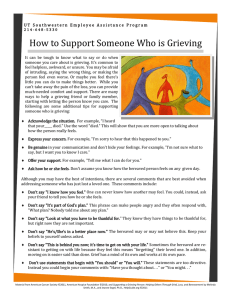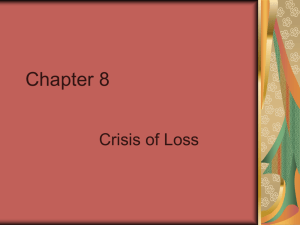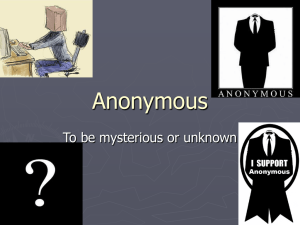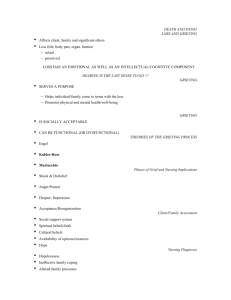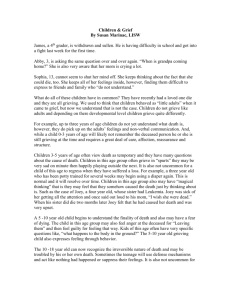How to Help a Grieving Friend
advertisement
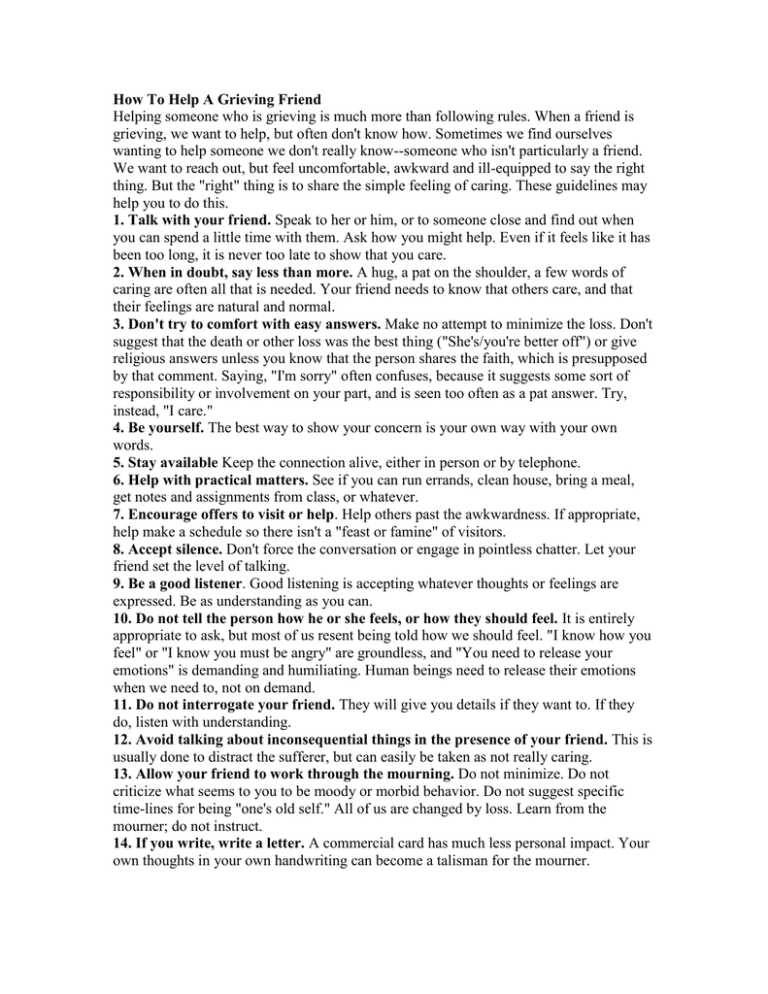
How To Help A Grieving Friend Helping someone who is grieving is much more than following rules. When a friend is grieving, we want to help, but often don't know how. Sometimes we find ourselves wanting to help someone we don't really know--someone who isn't particularly a friend. We want to reach out, but feel uncomfortable, awkward and ill-equipped to say the right thing. But the "right" thing is to share the simple feeling of caring. These guidelines may help you to do this. 1. Talk with your friend. Speak to her or him, or to someone close and find out when you can spend a little time with them. Ask how you might help. Even if it feels like it has been too long, it is never too late to show that you care. 2. When in doubt, say less than more. A hug, a pat on the shoulder, a few words of caring are often all that is needed. Your friend needs to know that others care, and that their feelings are natural and normal. 3. Don't try to comfort with easy answers. Make no attempt to minimize the loss. Don't suggest that the death or other loss was the best thing ("She's/you're better off") or give religious answers unless you know that the person shares the faith, which is presupposed by that comment. Saying, "I'm sorry" often confuses, because it suggests some sort of responsibility or involvement on your part, and is seen too often as a pat answer. Try, instead, "I care." 4. Be yourself. The best way to show your concern is your own way with your own words. 5. Stay available Keep the connection alive, either in person or by telephone. 6. Help with practical matters. See if you can run errands, clean house, bring a meal, get notes and assignments from class, or whatever. 7. Encourage offers to visit or help. Help others past the awkwardness. If appropriate, help make a schedule so there isn't a "feast or famine" of visitors. 8. Accept silence. Don't force the conversation or engage in pointless chatter. Let your friend set the level of talking. 9. Be a good listener. Good listening is accepting whatever thoughts or feelings are expressed. Be as understanding as you can. 10. Do not tell the person how he or she feels, or how they should feel. It is entirely appropriate to ask, but most of us resent being told how we should feel. "I know how you feel" or "I know you must be angry" are groundless, and "You need to release your emotions" is demanding and humiliating. Human beings need to release their emotions when we need to, not on demand. 11. Do not interrogate your friend. They will give you details if they want to. If they do, listen with understanding. 12. Avoid talking about inconsequential things in the presence of your friend. This is usually done to distract the sufferer, but can easily be taken as not really caring. 13. Allow your friend to work through the mourning. Do not minimize. Do not criticize what seems to you to be moody or morbid behavior. Do not suggest specific time-lines for being "one's old self." All of us are changed by loss. Learn from the mourner; do not instruct. 14. If you write, write a letter. A commercial card has much less personal impact. Your own thoughts in your own handwriting can become a talisman for the mourner. 15. Encourage the postponement of major decisions until after the period of intense grief. Whatever can wait should wait. 16. When it feels right, draw the mourner into outside activity. Start with quiet, gentle activities. Keep in mind that the person may not have the energy or initiative to begin outside ventures on his or her own. 17. When the mourner returns to social activities, treat him or her as a normal person. Mourning is a normal human activity. Don't imply pity; instead support selfrespect. Accept the appropriateness of the person's feelings and actions. Acknowledge the loss and the change in their situation, but don't dwell on it. 18. Be aware of needed progress through grief. Grieving takes time--and the length depends upon the individual. If the person seems truly stuck, gently suggest they seek help, or find assistance for yourself in knowing what to do next.
